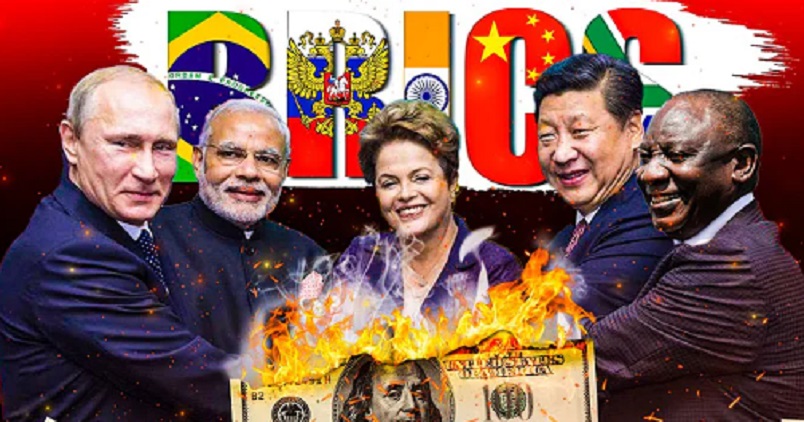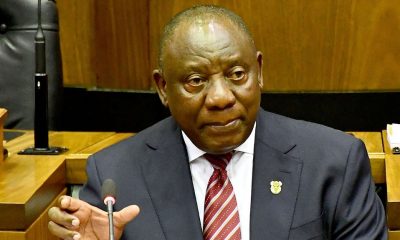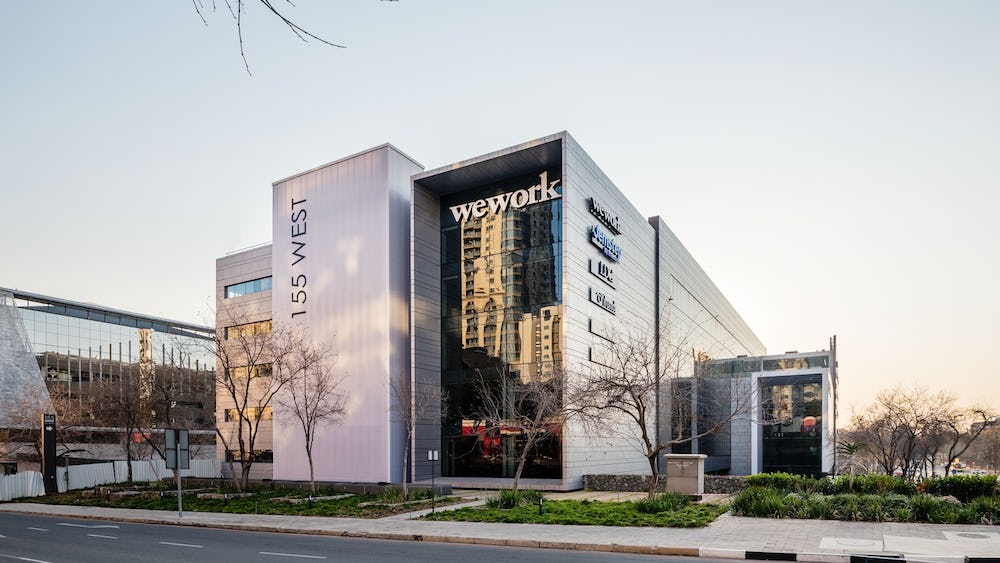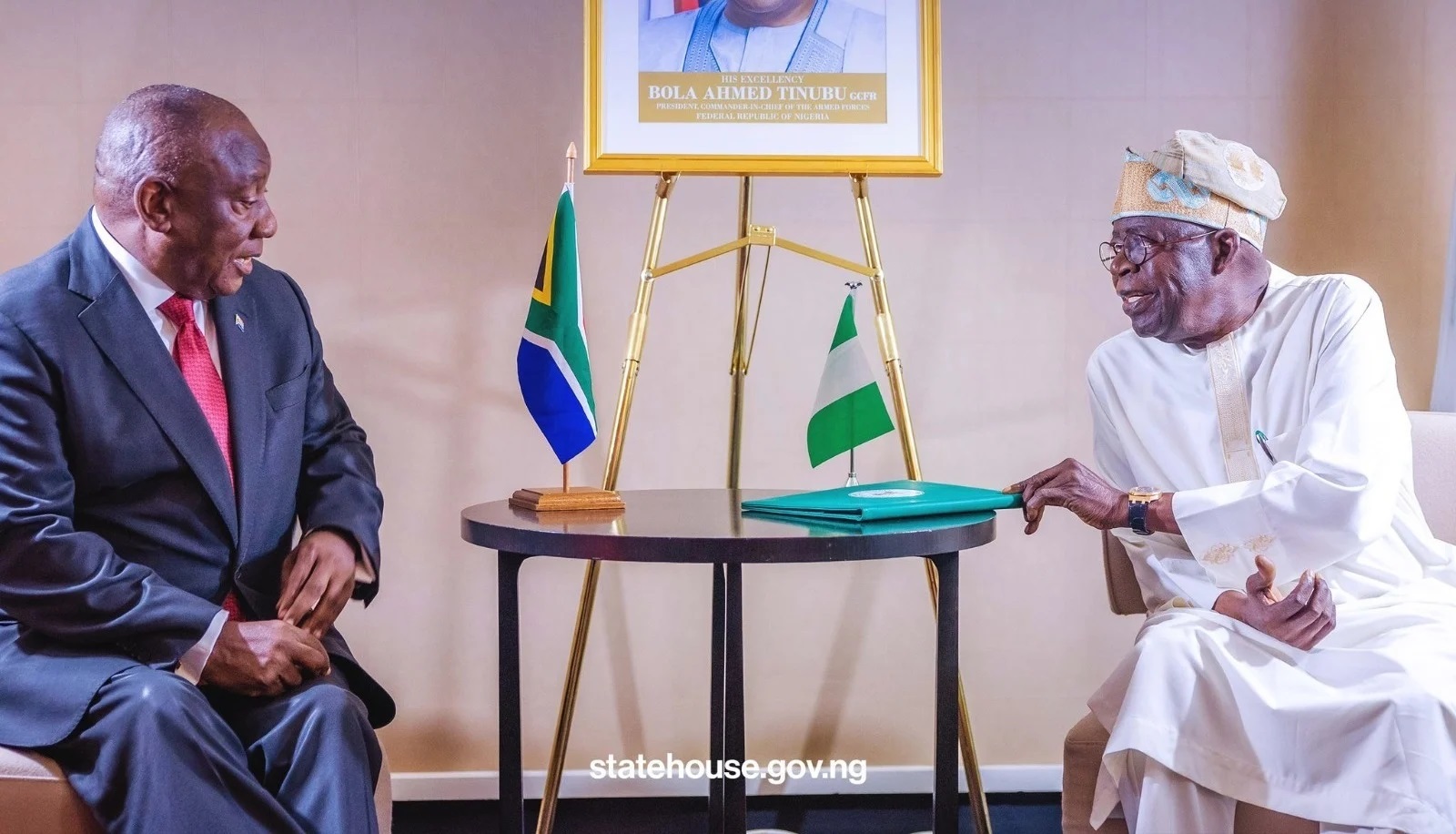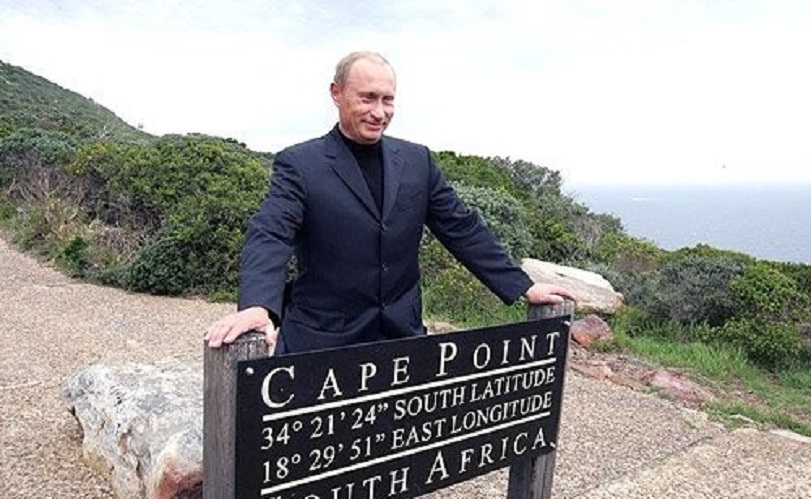Feature/OPED
South Africa BRICS Presidency: Challenges and Future Perspectives
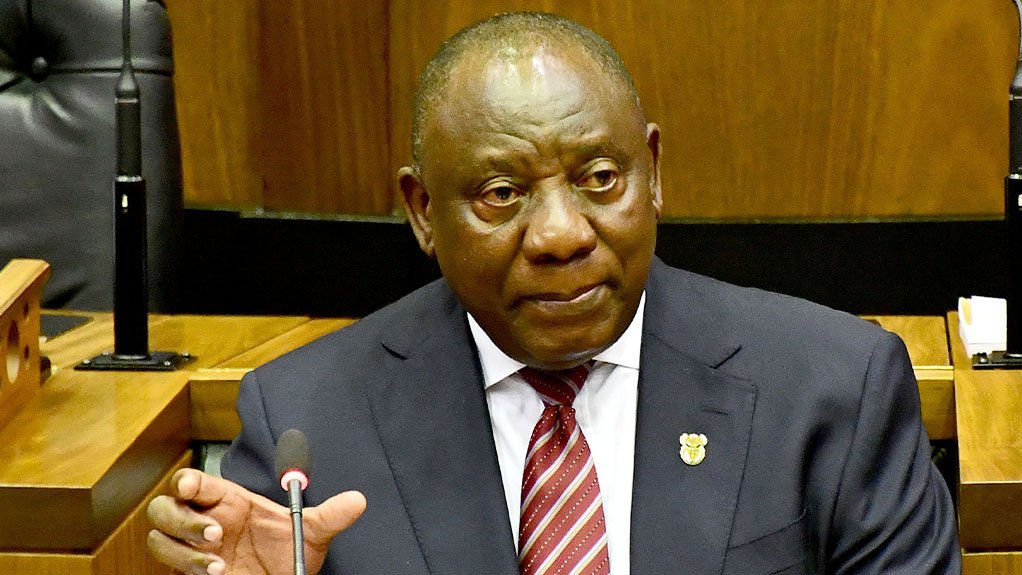
By Kestér Kenn Klomegâh
The next year 2023, South Africa, as per stipulated approved guidelines and rules, will hold the rotating presidency of BRICS, the organization of five emerging developing countries made up of Brazil, Russia, India, China and South Africa. This implies that South African President Cyril Ramaphosa has a lot more at hand, especially with the current global geopolitical changes to drum home, to consolidate the growing support underway for a few others to join BRICS.
Ramaphosa has already reminded us that South Africa will hold the BRICS rotating presidency in 2023. “That BRICS summit next year under the chairship of South Africa, the matter of expanding BRICS is going to be under serious consideration. A number of countries are consistently making approaches to BRICS members, and we have given them the same answer that it will be discussed by the BRICS partners, and thereafter a collective decision will be made.” the president said this December.
Russia’s Foreign Affairs Minister Sergey Lavrov told the gathering at the Primakov Readings forum held this early December that the quintet of BRICS economies (Brazil, Russia, India, China and South Africa) may turn into an organization of 15-17 countries, not just enthusiasm but if those wishing to join it are granted membership based on two principles: have the necessary conditions and the collective decision of the organization.
Lavrov, in his presentation, traced the historical establishment and development of the organization. “We all know that this format [RIC – Russia, India, China] paved the way for the BRICS Five, which currently enjoys great publicity and many countries line up seeking a full-fledged membership,” Lavrov said.
“If we meet all bids, then the ‘five’ will turn into about 15-17 countries as the BRICS summit in June, which was organized in a video conference format by our Chinese colleagues, showed us,” the foreign minister noted, and further stressed that the RIC remains an operational format and not only foreign ministers, but ministers of economy, energy and economic development as well, are meeting within the framework of this format.
“The RIC keeps thriving today, and not many know that this ‘trio’ continues holding meetings at the level of foreign ministers,” Lavrov continued. “Just a couple of months ago, we held such a meeting in the online format, and it was the 20th meeting of this kind since [ex-Foreign Affairs Minister] Yevgeny (Primakov) proposed to keep developing this format.”
“Besides the meetings of foreign ministers, there are meetings of energy, trade and economic development ministers as well as of numerous industrial members of the corresponding governments,” the Russian foreign minister added.
“We have real partners – BRICS, the SCO, the EAEU, and the CSTO, regardless of what is written about it,” Lavrov stated. The top diplomat stated that the RIC structure (Russia, India, China), a Primakov initiative, “spawned the BRICS five, which currently receives enormous attention.” Several states are lined up for full membership, and the five could expand to roughly 15-17 countries, Lavrov added.
Russia’s local Vedomosti reported that the number of BRICS members might triple during the Primakov Readings forum. According to the report, organizations such as BRICS are becoming an alternative against the backdrop of the weakness of the European Union. The emphasis on cooperation with non-Western states appears to be even more warranted in light of Europe’s current problems. The United States and its closest allies’ unjust policy toward key EU members.
Berlin and Paris do not have complete autonomy in international politics; thus, they deliberately cede some of their foreign policy functions to Washington, according to Alexander Kamkin, a Senior Researcher at IMEMO. The expert admits that the European countries are capable of taking the initiative in a few circumstances, but on the whole, they follow Washington’s lead.
According to Andrey Kortunov, Director General of the Russian International Affairs Council, BRICS can provide countries with an alternate partnership path to the EU that does not require a high admission threshold. According to him, the group is now developing along two avenues: by admitting new members and by strengthening cooperation.
In the second case, additional countries will not be admitted to BRICS, but each organization’s partner will be able to choose a convenient mode of cooperation within the BRICS+ structure. Kortunov noted that the EU is unwilling to seek strategic autonomy from the US not only due to the Ukrainian crisis but China’s ascent.
The possibility of expanding membership in the organization is still under discussion within the BRICS framework. Noteworthy to reiterate here that a decision was made at the five BRICS members summit on June 23-24 to launch a discussion for the purposes of determining the principles, standards, criteria and procedures of this process.
China and Russia have been pushing for the expansion of BRICS, soliciting support for the multipolar system of global governance instead of the existing rules-based unipolar directed by the United States. Often explained that a bigger BRICS primarily offers huge opportunities among the group members and for developing countries.
Russian President Vladimir Putin said at a plenary session of the Valdai International Discussion Club held on October 27 reaffirmed Russia’s unshakable support for Saudi Arabia joining BRICS. “Yes, we support it, but this requires a consensus of all the BRICS countries,” he said.
According to him, Saudi Arabia is a rapidly developing country, which is due not only to its leading position in the hydrocarbon market. “This is also due to the fact that the Crown Prince, the government of Saudi Arabia, has very big plans for diversifying the economy, which is very important. They have entire national development plans designed for this goal,” the Russian President said.
He expressed confidence that, given the enthusiasm and creativity of Crown Prince Mohammed bin Salman Al Saud, these plans will be implemented. “Therefore, of course, Saudi Arabia deserves to be a member of major international organizations, such as the BRICS and such as the SCO. Most recently, we determined the status of Saudi Arabia in the SCO and will develop relations with this country both bilaterally and on multilateral platforms,” Putin added.
With the current global unstable and volatile situation creating skyrocketing uncertainties in global economic recovery, China has unreservedly shown its contribution to strengthening BRICS. For 16 years since its inception, China has offered the largest financial support for the BRICS National Development Bank and contributed tremendously to other directions, including health, education and economic collaboration among the group.
That is why BRICS has gained extensive recognition. More and more countries are willing and interested in becoming members of the organization, making joint efforts to overcome difficulties and challenges, and realising common development and prosperity. BRICS activities have expanded during the past few years. Countries participated in the Outreach and BRICS plus segments of the organization. But now, with the emerging new global order, BRICS seeks to expand its membership and consolidate its platform as an instrument for pushing against the existing rules-based order unipolar system.
BRICS activities have expanded during the past few years. Countries participated in the Outreach and BRICS plus segments of the organization. There are also a number of African countries, including Algeria, Egypt, Ethiopia, Nigeria, and Senegal, that have also shown interest. Egypt has already been involved for a fairly long time. Last December 2022, Egypt, the decision on its accession to the New Development Bank was made by BRICS.
Russia has consistently advocated for deepening the organization’s interaction with the African continent, the diplomat stressed. In particular, President of the Russian Federation Vladimir Putin mentioned this at an expanded meeting of leaders of the five BRICS member-states in the BRICS plus format on June 24. It is, however, expected that this avenue of efforts will get an extra impetus during the presidency period of South Africa in 2023.
On May 19, China’s State Councillor and Foreign Minister Wang Yi chaired a video conference dialogue between foreign ministers of BRICS countries and their counterparts from emerging economies and developing countries. It was the first BRICS Plus dialogue at the level of foreign ministers. Participants in the dialogue came from BRICS countries as well as invited countries such as Kazakhstan, Saudi Arabia, Argentina, Egypt, Indonesia, Nigeria, Senegal, United Arab Emirates and Thailand.
According to Wang Yi, the dialogue’s importance was to further expand cooperation between the BRICS countries and other emerging economies and developing countries. In addition, Wang Wenbin, during his weekly media briefing on October 20, explained that as the BRICS chair for this year, China has actively supported the BRICS in starting the membership expansion process and advanced the BRICS Plus cooperation.
During the 14th BRICS summit successfully held in June 2022, President Xi Jinping noted at the meeting that BRICS countries gather not in a closed club or an exclusive circle but in a big family of mutual support and a partnership for win-win cooperation. At the summit, BRICS leaders reached important common understandings about BRICS expansion and expressed support for discussion on the standards and procedures of the expansion.
“This has been well received in the international community, and many countries have expressed interest in joining the BRICS. China supports and welcomes this. Going forward, China will work with fellow BRICS members to steadily proceed with the BRICS expansion process and enable more partners to join this promising endeavour,” Wenbin said at the media briefing.
Despite its large population of 1.5 billion, which many have considered an impediment, China pursues admirable collaborative strategic diplomacy with external countries, and that has made it attain superpower status over Russia. A careful study and analysis monitored by this author vividly show that muscle-flexing Russia largely lacks public outreach diplomacy, Russia contributing towards its own ‘cancel culture’ policy, and this is seriously detrimental to the emerging new global order.
South Africa was a late minor addition to the group, to add a bridgehead to Africa, says Charles Robertson, Chief Economist at Renaissance Capital. All the BRICS countries are facing economic challenges that need addressing urgently. The BRICS is keenly aware of the importance of contributing to Africa’s development agenda.
“Therefore, it could expand because the BRICS are under-represented in the global financial architecture. Europe and the United States dominate institutions like the International Monetary Fund (IMF) and the World Bank, and to some extent many others,” explained Robertson in an emailed query.
According to him, “Russia and others in the BRICS would like to see larger power centres emerge to offer an alternative to that Western-dominated construct. That is reasonable enough – providing there are countries with the money to backstop the new institutions, such as China supporting the BRICS bank, and if the countries offer an alternative vision that provides benefits to new members.”
South African Ramaphosa has repeatedly said that BRICS as a dynamic group would usher in a new global development era that promises a system of more inclusive, sustainable and fair principles. BRICS group, in an expanded form, can support a sustainable and equitable global economic recovery.
For South Africa, Ramaphosa further believes that the BRICS is simply a highly-valuable platform fixed to strengthen ties with partner countries in support of South Africa’s economic growth for discussing global economic problems and challenges and, above all, strengthening the role of developing countries.
After his official visit to Saudi Arabia in mid-October, Ramaphosa said that Crown Prince Mohammed bin Salman Al Saud had expressed the desire to join BRICS. “The Crown Prince did express Saudi Arabia’s desire to be part of BRICS. They are not the only country seeking membership in BRICS,” according to the local radio station ABC. That report said Argentina, Iran, Turkey and the UAE also voiced their intention to join the organization.
The BRICS embody a synergy of cultures and are a model of genuine multilateral diplomacy. Its structure is formed in compliance with the 21st century’s realities. Efforts within its framework are based on the principles of equality, mutual respect and justice.
Historically, the first meeting of the group began in St Petersburg in 2005. It was called RIC, which stood for Russia, India and China. Then later, Brazil joined and finally, South Africa in February 2011, which is why now it is referred to as BRICS. The acronym BRICS is derived from the member countries’ names in English. The BRICS (Brazil, Russia, India, China and South Africa) collectively represent about 26% of the world’s geographical area and about 42% of the world’s population.
Feature/OPED
AU Must Reform into an Institution Africa Needs

By Mike Omuodo
From an online post, a commentator asked an intriguing question: “If the African Union (AU) cannot create a single currency, a unified military, or a common passport, then what exactly is this union about?”.
The comment section went wild, with some commentators saying that AU no longer serves the interest of the African people, but rather the interests of the West and individual nations with greedy interests in Africa’s resources. Some even said jokingly that it should be renamed “Western Union”.
But seriously, how has a country like France managed to maintain an economic leverage over 14 African states through its CFA Franc system, yet the continent is unable to create its own single currency regime? Why does the continent seem to be comfortable with global powers establishing their military bases throughout its territories yet doesn’t seem interested in establishing its own unified military? Why does the idea of an open borders freak out our leaders, driving them to hide under sovereignty?
These questions interrogate AU’s relevance in the ensuing geopolitics. No doubt, the AU is still relevant as it still speaks on behalf of Africa on global platforms as a symbol of the continent’s unity. But the unease surrounding it is justified because symbolism is no longer enough.
In a continent grappling with persistent conflict, economic fragmentation, and democratic reversals, institutions are judged not by their presence, but by their impact.
From the chat, and several other discussion groups on social media, most Africans are unhappy with the performance of the African Union so far. To many, the organization is out of touch with reality and they are now calling for an immediate reset.
To them, AU is a club of cabals, whose main achievements have been safeguarding fellow felons.
One commentator said, “AU’s main job is to congratulate dictators who kill their citizens to retain power through rigged elections.” Another said, “AU is a bunch of atrophied rulers dancing on the graves of their citizens, looting resources from their people to stash in foreign countries.”
These views may sound harsh, but are a good measure of how people perceive the organization across the continent.
Blurring vision
The African Union, which was established in July 2002 to succeed the OAU, was born out of an ambitious vision of uniting the continent toward self-reliance by driving economic Integration, enhancing peace and security, prompting good governance and, representing the continent on the global stage – following the end of colonialism.
Over time, however, the gap between this vision and the reality on the ground has widened. AU appears helpless to address the growing conflicts across the continent – from unrelenting coups to shambolic elections to external aggression.
This chronic weakness has slowly eroded public confidence in the organization and as such, AU is being seen as a forum for speeches rather than solutions – just as one commentator puts it, “AU has turned into a farce talk shop that cannot back or bite.”
Call for a new body
The general feeling on the ground is that AU is stagnant and has nothing much to show for the 60+ years of its existence (from the times of OAU). It’s also viewed as toothless and subservient to the whims of its ‘masters’. Some commentators even called for its dissolution and the formation of a new body that would serve the interests of the continent and its people.
This sounds like a no-confidence vote. To regain favour and remain a force for continental good, AU must undertake critical reforms, enhance accountability, and show political courage as a matter of urgency. Without these, it may endure in form while fading in substance.
The question is not whether Africa needs the AU, but whether the AU is willing and ready to become the institution Africa needs – one that is bold enough to initiate a daring move towards a common market, a single currency, a unified military, and a common passport regime. It is possible!
Mr Omuodo is a pan-African Public Relations and Communications expert based in Nairobi, Kenya. He can be reached on [email protected]
Feature/OPED
Recapitalisation: Silent Layoffs, Infrastructure Deficit Threat to $1trn Economy

By Blaise Udunze
The Central Bank of Nigeria’s recapitalisation exercise, which is scheduled for a March 31, 2026, deadline, has continued to reignite optimism across financial markets and is designed to build stronger, more resilient banks capable of financing a $1 trillion economy. With the ongoing exercise, the industry has been witnessing bank valuations rising, investors are enthusiastic, and balance sheets are swelling. However, beneath these encouraging headline numbers, unbeknownst to many, or perhaps some troubling aspects that the industry players have chosen not to talk about, are the human cost of consolidation and the infrastructure deficit.
Recapitalisation often leads to mergers and acquisitions. Mergers, in turn, almost always lead to job rationalisation. In Nigeria’s case, this process is unfolding against an already fragile labour structure in the banking industry, one where casualisation has become the dominant employment model.
One alarming fact in the Nigerian banking sector is the age-old workforce structure raised by the Association of Senior Staff of Banks, Insurance and Financial Institutions (ASSBIFI), which says that an estimated 60 percent of operational bank workers today are contract staff. This reality raises profound questions about the sustainability of Nigeria’s banking reforms and the credibility of its economic ambitions.
A $1 trillion economy cannot be built on insecure labour, shrinking institutional knowledge, and an overstretched financial workforce.
Recapitalisation and the Hidden Merger Trap
History is instructive. Referencing Nigeria’s 2004-2005 banking consolidation exercise, which reduced the number of banks from 89 to 25, and no doubt, it produced larger institutions, while it also triggered widespread job losses, branch closures, and a wave of outsourcing that permanently altered employment relations in the sector. The current recapitalisation push risks repeating that cycle, only this time within a far more complex economic environment marked by inflation, currency volatility, and rising unemployment.
Mergers promise efficiency, but efficiency often comes at the expense of people. Speaking of this, duplicate roles are eliminated, technology replaces frontline staff, and non-core functions are outsourced. The troubling part of it is that this is already a system reliant on contract labour; mergers could accelerate workforce instability, turning banks into balance-sheet-heavy institutions with shallow human capital depth.
ASSBIFI’s warning is therefore not a labour agitation; it is a macroeconomic red flag.
Casualisation as Structural Weakness, Not a Cost Strategy
It has been postulated by proponents of job casualisation that it is a cost-control mechanism necessary for competitiveness. Contrary to this argument, evidence increasingly shows that it is a false economy. In reaction to this, ASSBIFI President Olusoji Oluwole, who kicked against this structural weakness, asserted that excessive reliance on contract workers undermines job security, suppresses wages, limits access to benefits and blocks career progression while affirming that over time, this erodes morale, loyalty, and productivity.
More troubling are the systemic risks. Casualisation creates operational vulnerabilities, higher fraud exposure, weaker compliance culture, and lower institutional memory.
One of the banking regulators, the Nigeria Deposit Insurance Corporation (NDIC), has not desisted from repeatedly cautioning that excessive outsourcing and short-term staffing models increase security risks within banks. On the negative implications, when employees feel disposable, ethical commitment weakens, and reputational risk grows.
Banking is not a factory floor. It is a trust business. And trust does not thrive in insecurity.
Inside Outsourcing Web of Conflict of Interest
Beyond cost efficiency, Nigeria’s casualisation crisis is also fuelled by a deeper governance problem, conflicts of interest embedded within the outsourcing ecosystem.
In many cases, bank chief executives and executive directors are reported to own, control, or have beneficial interests in outsourcing companies that provide services to their own banks. Invariably, it is the same firms supplying contract staff, cleaners, security personnel, call-centre agents, and even IT support. Structurally, this arrangement allows senior executives to profit directly from the same outsourcing model that strips workers of job security and benefits.
The incentive is clear. Outsourcing enables banks to maintain lean payrolls, bypass strict labour protections associated with permanent employment, and reduce long-term obligations such as pensions and healthcare. But when those designing outsourcing strategies are also financially benefiting from them, the line between efficiency and exploitation disappears.
This model entrenches casualisation not as a temporary adjustment tool, but as a permanent business strategy, one that externalises social costs while internalising private gains.
Exploitation and Its Systemic Consequences
The human impact is severe because the contract staff employed through executive-linked outsourcing firms often face poor working conditions, low wages, limited or no health insurance, and zero job security, which is demotivating. Many perform the same functions as permanent staff but without benefits, voice, or career prospects.
ASSBIFI has warned that prolonged exposure to such insecurity leads to psychological stress, declining morale, and reduced productive life years. Studies on Nigeria’s banking sector confirm that casualisation weakens employee commitment and heightens anxiety, conditions that directly undermine service quality and operational integrity.
From a systemic standpoint, exploitation feeds fragility. High staff turnover erodes institutional memory. Disengaged workers weaken internal controls. Meanwhile, this should be a sector where trust, confidentiality, and compliance are paramount; this is a dangerous trade-off if it must be acknowledged for what it is.
Why Workforce Numbers Tell a Deeper Story
It is in record that as of 2025, Nigeria’s banking sector employs an estimated 90,500 workers, up from roughly 80,000 in 2021. The top five banks today, such as Zenith, Access Holdings, UBA, GTCO, and Stanbic IBTC, account for about 39,900 employees, reflecting moderate growth driven by digital expansion and regional operations.
At face value, truly, these figures suggest resilience. But when viewed alongside the 60 percent casualisation rate, they paint a different picture, revealing that employment growth is without employment quality. A workforce dominated by contract staff lacks the stability required to support long-term credit expansion, infrastructure financing, and industrial transformation.
This matters because banks are expected to be the engine room of Nigeria’s $1 trillion economy, funding roads, power plants, refineries, manufacturing hubs, and digital infrastructure. Weak labour foundations will eventually translate into weak execution capacity.
Nigeria’s Infrastructure Financing Contradiction
Nigeria’s infrastructure deficit is estimated in the hundreds of billions of dollars. Power, transport, housing, and broadband require long-term financing structures, sophisticated risk management, and deep sectoral expertise. Yet recapitalisation-induced mergers often lead to talent loss in precisely these areas.
As banks consolidate, specialist teams are downsized, project finance units are merged, and experienced professionals exit the system, either voluntarily or through redundancy. Casual staff, by design, are rarely trained for complex, long-term infrastructure deals. The result is a contradiction, revealing that larger banks have bigger capital bases but thinner technical capacity.
Without deliberate workforce protection and skills development, recapitalisation may produce banks that are too big to fail, but too hollow to build.
South Africa Offers a Useful Contrast
South Africa offers a revealing counterpoint. As of 2025, the country’s “big five” banks, such as Standard Bank, FNB, ABSA, Nedbank, and Capitec, employ approximately 136,600 workers within South Africa and about 184,000 globally. This is significantly higher than Nigeria’s banking workforce, despite South Africa having a smaller population.
More importantly, South African banks maintain a far higher proportion of permanent staff. While outsourcing exists, core banking operations remain firmly institutionalized compared to the Nigerian banking system. For this reason, South Africa’s career progression pathways are clearer, labour regulations are more robustly enforced, and unions play a more structured role in workforce negotiations.
The result is evident in outcomes. South Africa’s top six banks are collectively valued at over $70 billion, with Standard Bank alone boasting a market capitalisation of approximately $30 billion and total assets nearing $192 billion. Nigeria’s top 10 banks, by contrast, held combined assets of about $142 billion as of early 2025, even with a much larger population and economy, and its 13 listed banks reached a combined market capitalisation of about N17 trillion ($11.76 billion at an exchange rate of N1,445) in 2026.
Though this gap is not just about capital. It is about institutional depth, workforce stability, and governance maturity.
Bigger Valuations, But a Weaker Foundations?
Nigeria’s 13 listed banks reached a combined market capitalisation of about N17 trillion in 2026. It is no surprise, as it is buoyed by investor anticipation of recapitalisation and higher capital thresholds. Yet market value does not automatically translate into economic impact. Without parallel investment in people, systems, and long-term skills, valuation gains remain fragile.
South Africa’s experience shows that strong banks are built not only on capital adequacy, but on human capital adequacy. Skilled, secure workers are better risk managers, better innovators, and better custodians of public trust.
Labour Law and its Regulatory Blind Spots
ASSBIFI’s call for a review of Nigeria’s Labour Act is timely, and this is because the current framework lags modern employment realities, particularly in sectors like banking, where technology and outsourcing have blurred traditional employment lines. Regulatory silence has effectively legitimised casualisation as a default model rather than an exception.
The Central Bank of Nigeria cannot afford to treat workforce issues as outside its mandate. Prudential stability is inseparable from labour stability. Regulators must begin to view excessive casualisation as a risk factor, just like liquidity mismatches or weak capital quality.
Recapitalisation Without Inclusion Is Incomplete
If recapitalisation is to succeed, it must be inclusive; therefore, the industry must witness the enforcement of career path frameworks for contract staff, limiting the proportion of outsourced core banking roles, and aligning capital reforms with employment protection. It also means recognising that labour insecurity ultimately feeds systemic fragility.
South Africa’s banking sector did not avoid consolidation, but it managed it alongside workforce safeguards and institutional continuity. Nigeria must do the same or risk building banks that look strong on paper but crack under economic pressure.
True Measure of Reform
Judging by the past reform in 2004-2005, it has shown that Nigeria’s banking recapitalisation will be judged not by the size of balance sheets, but by the resilience of the institutions it produces. As part of the recapitalisation target for more resilient banks capable of financing a $1 trillion economy, it demands banks that can think long-term, absorb shocks, finance infrastructure, and uphold trust. None of these goals is compatible with a workforce trapped in perpetual insecurity.
Casualisation is no longer a labour issue; it is a national economic risk. If mergers proceed without deliberate workforce stabilisation, Nigeria may end up with fewer banks, fewer jobs, weaker institutions, and a slower path to prosperity.
The lesson from South Africa is clear, as it shows that strong banks are built by strong people. Until Nigeria’s banking reforms fully embrace that truth and the missing pieces are addressed, recapitalisation will remain an unfinished project. and the $1 trillion economy, an elusive promise.
Blaise, a journalist and PR professional, writes from Lagos, can be reached via: [email protected]
Feature/OPED
In Nigeria… One Day Monkey Go Go Market

By Prince Charles Dickson PhD
In Nigeria, the road has become a stage where power performs its most absurd theatre. The siren—once a tool of emergency—now plays the soundtrack of ego. The convoys, longer than a bride’s procession, louder than a market quarrel, move through our streets like small invading armies. And every time that blaring, violent sound slices through the air, a simple truth echoes behind it: one day monkey go go market… and e no go return.
Because power, especially Nigerian power, has a short memory. And even shorter patience.
These leaders who move as though the sun itself must pause when they pass were once ordinary Nigerians. They once queued at bus stops, once waited under the rain for taxis, once navigated potholed streets with the same caution as every other citizen trying not to die by negligence. But somewhere between election and inauguration, ambition and arrogance, something snapped. Their feet left the ground. Their humanity blurred. And their ears, now accustomed to sirens; forgot how silence feels.
The bizarre culture of convoys in Nigeria has metastasized into something theatrical, violent, and deeply offensive. What began as protocol has become performance. Sirens scream not just to clear the road, but to announce hierarchy. Vehicles speed not just to meet schedules but to demonstrate superiority. And the citizens, the people in whose name this power is supposedly held, scatter like startled chickens. Or worse, end up dead under tires that never brake.
The irony is painful. The same leaders who demand absolute obedience from citizens once walked among those same citizens unnoticed. Once upon a time they lived without outriders, without black-tinted SUVs, without pickup vans carrying heavily armed security men who point guns at commuters as though Lagos traffic is a battlefield. They were once people. Now they behave like a species apart.
But the road remembers. The people remember. And power always forgets that it is a tenant, never a landlord.
Escorts in Nigeria don’t just move with urgency; they move with intimidation. They shove, push, threaten, and roar through roads where ordinary Nigerians are merely trying to survive the day. The siren becomes a weapon, the convoy a declaration of dominance. The message is clear: “Your life must move aside. My importance is passing.”
In what country should this be normal?
Even emergency vehicles; ambulances carrying dying patients, fire trucks racing to burning buildings, sometimes cannot pass because a government official’s convoy has occupied the road with the entitlement of royalty.
This isn’t governance; it’s theater of the absurd.
And the casualties are not metaphorical. Nigerians have died—pregnant women hit by convoys, okada riders knocked off the road, children flung away like debris. Drivers in these convoys behave like warhorses let loose, sworn not to slow down regardless of what or who is ahead.
But who will hold them accountable? Who dares question power that sees questions as disrespect and disrespect as rebellion?
The institutions meant to regulate these excesses are the same institutions that created them. Protocol offices treat speed like divinity. Security details mistake aggression for duty. Schedules are treated as holy commandments. Every meeting becomes urgent. Every movement becomes life-or-death. Every road must clear.
But the truth sits quietly behind all this noise: no meeting is that important, no leader is that indispensable, and no road should require blood to make way.
Somewhere, a child grows up believing public office means public intimidation. A young man sees the behavior of convoys and dreams not of service but of dominance. A young woman imagines that leadership means never waiting in traffic like the rest of society. And so, the cycle of arrogance reproduces itself. A country becomes a laboratory where entitlement multiplies.
In Nigeria, the convoy culture reveals a deeper sickness: a leadership class that has disconnected from the lived realities of the people they claim to govern.
When did proximity to power become justification for violence?
When did schedules become more sacred than lives?
When did we normalize leaders who move like emperors, not elected representatives?
But more importantly: how do these leaders forget so quickly where they came from?
Many of them grew up in the same chaos their convoys now worsen. They once asked why leaders were insensitive. Now they have inherited the same insensitivity and advanced it.
The convoy is more than metal and noise. It is a metaphor. It illustrates how Nigerian governance often operates: pushing the people aside, demanding unquestioned obedience, prioritizing position over responsibility.
And yet, the proverb whispers:
One day monkey go go market… e no go return.
Not because we wish harm on anyone, but because history has its own logic. Power that forgets compassion eventually forgets itself. Leadership that drives recklessly, morally, politically, and literally—will one day crash against the boundaries of public patience.
This metaphor is a quiet mirror for every leader who believes their current status is divine permanence. One day, the sirens will go silent. The tinted windows will roll down. The outriders will be reassigned. The road will no longer clear itself. Reality will return like harmattan dust.
And then the question will confront them plainly:
When your power fades, what remains of your humanity?
The tragedy of Nigeria’s convoy culture is that it makes leadership look like tyranny and renders citizens powerless in their own country. It fosters a climate where ordinary people live in perpetual startle. It deepens distrust. It fuels resentment. It reinforces the perception that leadership is designed to intimidate rather than serve.
And what does it say about us as a nation that we accept this?
We accept the absurdity because we assume it cannot be overturned. We accept arrogance because we assume it is the price of power. We step aside because we assume there is no alternative.
But nations are not built on assumptions. They are built on accountability.
The temporary nature of political power should humble leaders, not inflate them. Four or eight years or whatever time they spend clinging to office cannot compare to the lifetime they will spend as private citizens once the convoys disappear.
When the noise stops, will they walk among us head high or with their face hidden?
When the sirens lose their voice, will they find their own?
What if true leadership was measured not by how loudly you move through society but by how gently you walk among the people?
Imagine a Nigeria where power travels quietly. Where convoys move with the dignity of service, not the violence of entitlement. Where leaders move with humility, not hysteria. Where the streets do not tremble at the approach of authority. Where citizens do not shrink to the roadside, waiting to survive the thunder of tinted SUVs.
It is possible. It is necessary. It begins with leaders remembering that every journey through Nigeria’s roads is a reminder of their accountability, not their dominion.
Because one day, and it will come—monkey go go market.
The convoy will stop.
The siren will fade.
The power will dissolve into yesterday.
And the road will ask the only question that matters:
While you passed through, did you honor the people… or terrorize them?
History will remember the answer.
And so will we—May Nigeria win!
-

 Feature/OPED6 years ago
Feature/OPED6 years agoDavos was Different this year
-
Travel/Tourism9 years ago
Lagos Seals Western Lodge Hotel In Ikorodu
-

 Showbiz3 years ago
Showbiz3 years agoEstranged Lover Releases Videos of Empress Njamah Bathing
-

 Banking8 years ago
Banking8 years agoSort Codes of GTBank Branches in Nigeria
-

 Economy3 years ago
Economy3 years agoSubsidy Removal: CNG at N130 Per Litre Cheaper Than Petrol—IPMAN
-

 Banking3 years ago
Banking3 years agoSort Codes of UBA Branches in Nigeria
-

 Banking3 years ago
Banking3 years agoFirst Bank Announces Planned Downtime
-

 Sports3 years ago
Sports3 years agoHighest Paid Nigerian Footballer – How Much Do Nigerian Footballers Earn


